Webinar Gallery
Brown marmorated stink bug (Halyomorpha halys) is an invasive pest that sucks the sap out of plant stems and unripe fruit using straw-like mouthparts. It is a serious threat to BC’s agriculture and food industry. In the winter, watch for these bugs hibernating in your house.
Brown marmorated stink bugGrow your knowledge of invasive species.
Watch our recorded webinars at your convenience. Each webinar lasts up to one hour and features guest subject matter experts and ISCBC staff. Visit events to register for live webinars, usually held monthly. Accredited webinars are offered through the Learning Centre.
Audio Webinars
Check out our Video Webinars on our YouTube Channel:
2023
Overview
Discover the environmental factors affecting the impact of Zebra and Quagga mussel invasions. Brielle shares the insights she’s gained from the field and how you can make a difference in the fight against aquatic invasive species.
Overview
Explore the significance of responsible outdoor recreation and its crucial role in stewarding natural spaces. This webinar provides practical tips to help you make the most of your outdoor adventures while reducing your impact on the environment.
Overview
Native plants require less water, and fare better in extreme weather. Gardenworks’ Scott Pearce shares his top tips and some of his favorite native plants that can transform your yard and garden into their most vibrant states.
Overview
Prevent the release of invasive species. Amy McLaughlin, founder of Amy’s Bunny Barn, discusses the importance of research before adopting or buying a pet, shedding light on the societal impacts of releasing rabbits into the wild.
Video Webinars
Check out our Video Webinars on our YouTube Channel:
2023
Overview
Join the BC Ministry of Forests Invasive Plant Program staff to hear an overview of InvasivesBC, BC’s newly released invasive species database and mapping application which replaced the BC Invasive Alien Plant Program (IAPP) database in June of 2023. This webinar will cover how to obtain access and use the database for those new to the system, and dive into more specific lessons learned and tips and tricks to avoid errors and streamline data entry to support those already using it.
This webinar is co-hosted by the Integrated Vegetation Management Association (IVMA) of British Columbia.
Overview
Discover the environmental factors affecting the impact of Zebra and Quagga mussel invasions. Brielle shares the insights she’s gained from the field and how you can make a difference in the fight against aquatic invasive species.
Overview
Invasive species education aligns with multiple curriculum themes while lending itself to outdoor learning, community involvement and social responsibility.
Invasive Species Student Education and Action is an engaging workshop with:
- Demonstrations of hands-on activities and student-led projects
- Shared stories on how young people can take action on invasive species
- How to deepen student observations using nature journaling
- Tips on how to become stewards of a local greenspace
- A tour of ISCBC’s suite of educational resources and ready to go lesson plans
Overview
Explore the significance of responsible outdoor recreation and its crucial role in stewarding natural spaces. This webinar provides practical tips to help you make the most of your outdoor adventures while reducing your impact on the environment.
Overview
Native plants require less water, and fare better in extreme weather. Gardenworks’ Scott Pearce shares his top tips and some of his favorite native plants that can transform your yard and garden into their most vibrant states.
Overview
Prevent the release of invasive species. Amy McLaughlin, founder of Amy’s Bunny Barn, discusses the importance of research before adopting or buying a pet, shedding light on the societal impacts of releasing rabbits into the wild.
Overview
Climate change predictions for the Pacific Northwest region of North America include both warmer and more unpredictable weather, such as extreme flooding events. The predicted increase in atmospheric rivers in the Pacific Northwest region favours many invasive plant species adapted to dispersing or reproducing under such conditions, as my research team has been monitoring for knotweed spp. in response to the extreme flooding in November 2021 in BC.
This webinar is eligible for 1 Continuing Education Credit towards pesticide recertification in BC and Alberta. To receive this credit, go to the ISCBC learning center to watch the recording and complete the quiz.
Overview
Drinkwater Environmental Services has been involved with acquiring the following Pesticide Use Permits: 738-0027-18-21, 738-0028-18-21, and 169-009-21-24. These permits have specifically covered the management of knotweed using herbicides within pesticide free zones (PFZ) adjacent to water bodies. This talk will focus on the work that has been conducted within the jurisdiction of the City of Abbotsford. In addition to the process of acquiring these permits recent conversations with the Ministry of Environment regarding the management of invasive species on private land by a contracted party will be covered.
This webinar is co-hosted by the Integrated Vegetation Management Association (IVMA) of British Columbia.
Overview
Learn about the ISCBC Invasive-Wise Tourism program and how you can support operators in your region to sign up as partners! This webinar is intended for tourism associations, destination marketing organizations, community organizations, and anyone else who might have an interest in learning more about how to share key invasive species messaging with tourism operators in their region.
2022
Overview
This webinar will outline the approach to invasive plants in BC Ministry of Highways and Infrastructure Gravel Pits. The historic approach to invasive plant management in gravel pits will be discussed along the goals, objectives and logistics to this strategic approach. It will conclude with the reporting process and positive results achieved using this approach and a overview of the benefits.
This webinar is co-hosted by the Integrated Vegetation Management Association (IVMA) of British Columbia.
Overview
If you would you like a better understanding of what pesticides are, why they are used and how they are regulated to ensure they are safe, watch this webinar presented by CropLife Canada, Lab to Label. Pesticides, and their safety, can be complex topics to explain but this webinar can help by providing you with a look at how a pesticide goes from being discovered in the lab to becoming a registered product in Canada, and why Canadians can feel confident in the safety of these products.
This webinar is co-hosted by the Integrated Vegetation Management Association (IVMA) of British Columbia.
Overview
Naomi Nichol, Senior Policy analyst at the Fish and Wildlife Branch of the Ministry of Forests, provides overview of invasive rabbit species and their effects on the environment. Where do these rabbits exist, what is the problem, and what can we do about it? Rabbits come with the added difficulty of the public seeing them as pets, and so resist methods used to control other invasive species. This webinar is an exploration of the legislative, educational, and control methods we have in our toolbox, and how we need all three to address issues with invasive rabbits.
Overview
Cory Cliffe, 7 Generations Steward Society, presents about First Nations traditional medicine and the impacts of invasive species. This presentation is designed to highlight the need to research and protect traditional medicines and provide education for consultants working in First Nation territories – not just to identify significant species but to have the forethought to connect with elders and community to protect what traditionally belongs to the nations of the land.
Overview
This presentation examines the acute health risks associated with the use of pesticides, based on their relative toxicity and the degree of exposure. While we cannot change the toxicity of a pesticide, we CAN change the extent of our exposure to it. In this presentation we will look at ways to reduce exposure through best practices such as; limiting the frequency and duration of pesticide use, selecting appropriate application technology and personal protective equipment, and other approaches to providing a safety-conscious work environment.
Even with all the safeguards and training in place, incidents still happen, and it is important that everyone involved is prepared to administer First Aid, should an accidental exposure occur. We will discuss the practical approaches to handling the common routes of exposure; however, this does not replace the need for proper Standard First Aid training through an authorized training provider.
Overview
Our Education Team presents on ways to teach about aquatic invasive species. First off, they share knowledge of aquatic invasive species and their impacts in BC and what we can all do to play our part to help prevent the spread. Then, they share some fun and engaging activities you can do with your students to learn about aquatic invasive species, plus find out how you can join our Invasive-Wise Education program.
Overview
In this webinar Marina Wright, Fisheries and Oceans Canada, shares information about European Green Crab, their biology, how to identify them, how they arrived in BC, where they are currently found in the province, and their potential impacts to our marine environment. We also celebrate the launch of a new e-course on European Green Crab that is hosted by the Invasive Species Council of BC in collaboration with Fisheries and Oceans Canada. This webinar is supported by Fisheries and Oceans Canada and the Pacific Salmon Foundation and the Port of Vancouver.
Overview
The Indigenous Invasive Species Network hosted Dr. Nancy Turner who presented the work herself and Dr. Luschiim Arvid Charlie on medicinal plants, cultural values, and looking after the land in a changing world.
Overview
The Invasive Species Council of BC explores the risks and impacts of invasive species in the Yukon, and the key pathways through which they can enter and establish in the territory, specifically in aquatic habitats. As the climate begins to change, more invasive species are finding their way into our remote and pristine northern regions. Learn how you can play your part in preventing the spread!
Overview
The Indigenous Invasive Species Network hosted Dr. Nancy Turner who Join us in this installment of our Spring Water Webinar series as Lennard Joe, RPF, Grizzly Path Consulting, presents his perspective on aquatic invasive species. Learn how they are impacting Indigenous communities and threatening identified Species At Risk in British Columbia.
This webinar is supported by Fisheries and Oceans Canada.
Overview
The second installation of our Spring Water Webinar Series! “Water” we talking about? This five part webinar series focuses on aquatic invasive species and BC’s waterways.
In this presentation, Living Lakes Canada’s National Lake Blitz Program Coordinator shows you how you can get involved in this new and exciting entry-level citizen science program taking place in communities across Canada. The goal of the National Lake Blitz is to encourage widespread water monitoring of lakes, by using simple tools that help participants easily understand the impacts of climate change on freshwater lakes. To monitor a lake, participants don’t need a technical background or any formal training. All that’s needed to be a Lake Blitz volunteer is a thermometer, a camera and a lake you care about.
Living Lakes Canada is looking for volunteers to sign up and help monitor as many lakes as possible this year. Given last year’s heat domes, fires and floods, monitoring our precious freshwater sources is more urgent than ever. This presentation will show why simple monitoring is important for understanding the health of freshwater lakes and how easy it is for you to get involved.
Overview
With this webinar we kicked-off our Spring Water Webinar Series! “Water” we talking about? This five part webinar series focuses on aquatic invasive species and BC’s waterways.
Get your feet wet in the first webinar of the series with ISCBC’s Ruby Banwait and Steven Hayward. Explore what makes an aquatic species invasive, how they spread and some key species of concern in BC, both freshwater and marine.
Could you be a community scientist? Ruby and Steven also share interesting community observations made through iNaturalist and how your reports can help manage and prevent invasive species in our waters.
This webinar is supported by Fisheries and Oceans Canada.
Overview
The Invasive Species Council of BC and British Columbia Lake Stewardship Society (BCLSS) host an aquatic invasive species webinar! This webinar covers aquatic invasive species, identification of high-risk species, best practices for prevention and how to report these aquatic invaders. This webinar will most benefit boaters, marina and tourism operators, anglers and recreationalists!
Overview
The Invasive Species Council of BC was proud to partner with Métis Nation BC for this tailored virtual training workshop. The workshop enables community members to gain practical skills and knowledge about invasive species, explore the impacts they have on traditional and medicinal species and take action to report them and prevent their spread.
2021
Overview
Biological control, or biocontrol, is a very important tool in controlling invasive species. It involves controlling various pests, including invasive plants, by introducing natural enemies.
Using biological control as a management tool in BC involves a multifaceted approach, from navigating legislation, policies and funding, to examining multi-country research, current science, data and databases, agencies and practitioners.
Most importantly, using biological control to manage invasive plants requires an understanding of the biocontrol agents, the plants to be controlled and the life cycles and timing of each. This presentation provides an overview of these topics and where practitioners can find more information on using biocontrol effectively.
This webinar is approved in British Columbia for one Continuing Education Credit (CEC) towards pesticide applicator certification. To qualify for the credit, please access the webinar through ISCBC’s Learning Centre.
Presenter Bio
Susan Turner has been with the BC MFLNRORD Invasive Plant Program for twenty-nine years. As her program is provincial in scope, Susan has an appreciation for the variety and uniqueness of the province and the invasive plant issues. She is a Professional Agrologist and a licensed teacher. She holds a BSc in Biology and a BEd in secondary sciences from the University of BC As the Biocontrol Specialist, Susan is a liaison with federal and global biological control scientists on behalf of BC’s interests and maintains a current understanding of legal requirements to import biocontrol agents. She oversees the program that is committed to obtaining new biocontrol agents for the province, understanding their BC habitat requirements and effects on their target plants and ensuring information is shared with clients and the public.
Overview
There are many considerations when timing herbicide treatments for the control of invasive plant species, including the target weed species, the stage of growth, other plants on site and more. Watch this informative webinar and explore the considerations for timing of fall herbicide applications with ISCBC’s Dave Ralph.
Presenter Bio
Dave Ralph, Operations and Extension Manager, has been with ISCBC since 2015. He has worked in all aspects of invasive plant management and extension for over 40 years, with the BC Ministry of Agriculture, the Western Indian Agriculture Corporation and the BC Ministry of Forest, Lands and Natural Resource Operations. Dave now manages ISCBC’s technical invasive plant extension, the Gravel Pit Invasive Plant Management Program and Stronger BC operations.
Overview
Join ISCBC’s education team to learn more about our new Invasive Species in the School program and walk away with lessons you can use in your classroom!
This new pilot program includes a free set of BC curriculum-linked lesson plans for grades 4-7 that you can use in your classroom or at home! Activities engage students in hands-on learning and provide knowledge, skills and opportunities to deepen their connection to biodiversity and community. Explore fun, hands-on activities that get your students outdoors this spring that can be done right in your backyard or a local park.
The lessons are supported by interactive online resources, videos and community science reporting tools, and inspire students to take action around environmental issues.
Presenter Bio
Sue Staniforth is the Education and Outreach Manager with the Invasive Species Council of BC. As a biologist and educator, Sue brings to her work over 30 years of experience researching and writing curriculum on topics ranging from biodiversity to outdoor classrooms, facilitating professional development workshops and training industry professionals. Sue has been honoured to work with a number of Indigenous communities in BC, as well as stewardship groups provincially and nationally.
Stephanie Weinstein is the Education Lead with the Invasive Species Council of BC. She is a biologist and environmental educator with over 20 years of experience. Whether facilitating professional development workshops with teachers, exploring BC’s great outdoors with children, or developing curriculum-linked lesson plans and activities, she is passionate about connecting people to nature and inspiring them to learn about, care for, and take action to protect biodiversity.
Overview
Find out how to become part of the solution – learn how to identify and report new invasive plants and the most likely places they will occur.
Every year new invasive species are introduced to BC. Early detection is crucial to protect the environmental, social and economic values we hold dear and to prevent new introductions. The provincial government works with local governments, subject matter experts and other partners to detect these species early, containing and eradicating populations to prevent further spread.
This talk focuses on several new invasive plant species and the challenges of early detection, pathway interception, physical containment, developing new treatment methods and treatments on or adjacent to private lands and waterways.
This webinar is approved in British Columbia for one Continuing Education Credit (CEC) towards pesticide applicator certification. To qualify for the credit, please access the webinar through ISCBC’s Learning Centre.
Presenter Bio
Becky Brown is a Professional Agrologist with the British Columbia (BC) Institute of Agrologists and an Invasive Plant Specialist with the BC Ministry of Forests, Lands, Natural Resource Operations and Rural Development. She has been working in natural resource management throughout BC for the past 25 years, focusing on invasive plants since 2003. Her primary focus is coordinating the provincial Early Detection Rapid Response Program for invasive plants. She also provides technical support to land managers working with established invasive plants in the South Coast region of BC.
Overview
Join ISCBC research staff to learn more about photographing invasive species. Learn how to use these great photographs to report invasive species so that you can contribute to science in your community!
Presenter Bio
Nick Wong, ISCBC’s project coordinator, has diverse experience working in the Pacific salmon and herring fisheries in BC, consulting and quality assurance and has a PhD in Marine Ecology from the University of Auckland, New Zealand.
Nick has been extensively involved in the coordinated response to the Japanese beetle invasion in Vancouver, helping with facilitation, outreach and education. He is passionate about photography and helping people learn about the role they can play in preventing the spread of invasive species.
Overview
The Scott Islands Marine National Wildlife Area covers 11,546 square kilometers of entirely marine environment located off the northwestern tip of Vancouver Island, British Columbia. Invasive species such as rodents, mustelids and raccoons are one of the most pressing threats to the millions of seabirds that breed on the Scott Islands. In this webinar, David Bradley of Birds Canada, will summarize the current status of seabird populations on the Scott Islands, the invasive species present on the islands and the efforts underway to prevent future spread of invasive mammals to the Scott Islands.
Presenter Bio
David Bradley is the Director of the BC office for Birds Canada, where he manages various outreach and citizen science projects. He is particularly involved in several invasive species projects in Haida Gwaii, the North Coast and the Scott Islands.
Overview
The webinar focuses on the formulations of herbicides and the effect turbidity, pH, and water hardness have on products. The basics of product mixing and common issues that can occur when mixing will also be addressed.
This webinar is approved in British Columbia for one Continuing Education Credit (CEC) towards pesticide applicator certification. To qualify for the credit, please access the webinar through ISCBC’s Learning Centre.
Presenter Bio
Gavin Lunn is the Regional Account Manager, Ontario & Manitoba, with Corteva Agriscience. In his role at Corteva Agriscience, Gavin goes beyond providing simple recommendations to deliver full season solutions for his customers. He’s there from start to finish, during soil sampling and analysis, providing fertilizer and seed recommendations, and building the right Integrated Pest Management (IPM) plan for the crop, area and seasonal pattern.
Overview
BC is a popular angling hotspot attracting recreational tourists from the province and beyond. Our native sport species, specifically salmon and trout, attract anglers from around the world. Unfortunately invasive fish species such as bass have ended up in some of BC’s fishing spots and are also attracting sport anglers. This webinar will discuss the increasing popularity of some invasive fish for angling in BC and the related impacts on native species.
Presenter Bio
Gillian Steele is an avid angler who has spent her lifetime pursuing British Columbia’s vast array of fish species in both salt and freshwater. As an angler, she has encountered and pursued many invasive species in her trips as well as seen the extent of their spread throughout the province. Gill is a Director for the Steelhead Society of British Columbia and one of the founders of the BC Women’s Fly Fishing Group.
Overview
This webinar highlighted the many connections between invasive species and the tourism industry. Learn how visitors can unknowingly (and sometimes on purpose!) introduce invasive species and the impacts on biodiversity and the economy as a whole. This webinar is ideal for tourism operators and partners to learn how the industry can work to prevent the spread of invasive species.
Presenter Bio
Anthony Mallinson is the Tourism Resource Coordinator with the Invasive Species Council of BC. Anthony works with tourism owners, operators, and staff to prevent the spread of invasive species through tourism activities. Anthony has spent the last three years working in the tourism industry as a sea-kayak guide and naturalist, and has a background in environmental sciences from Dalhousie University.
2020
Overview
As in terrestrial environments, the movement of people and goods to coastal environments has resulted in an increasing number of introduced and invasive species in marine ecosystems. British Columbia is already host to a number of significant marine invasive species, including the European green crab (Carcinus maenas), one of IUCN’s ‘worst’ invaders. This talk will explain some of the unique challenges to understanding marine invasions, using green crab as an example, and summarize what we know (and do not know) about the impacts of this species to British Columbia’s ocean ecosystem.
Presenter Bio
Brett Howard began her academic career at the University of Alberta (Bachelor of Science, 2010), before going to Dalhousie University in Halifax (Masters in Marine Management, 2012), and rounded off her tour of Canadian universities by completing her PhD at Simon Fraser University (2019). Her thesis work focused on the spread and impacts of invasive marine crabs, focusing on European green crab. Currently, Brett is continuing her work on invasive species as a biologist with Fisheries and Oceans Canada.
Overview
Gavin Hanke, curator of vertebrate zoology at the Royal BC Museum, will detail the recent history of three exotic reptiles in BC. The Common wall lizard is the most successfully established exotic reptile in BC. The Italian Wall Lizard, known to be established on Orcas Island in Washington, made its first appearance in Canada in Vancouver in 2019. The Western Fence Lizard was already introduced to many locations in Puget Sound when it first appeared in BC (and Canada) in 2020. Several temperate species in the pet trade threaten our environment when they are let loose or escape. Climate change will only make our region more inviting to such species. Gavin will highlight characteristics of high risk reptilian invaders.
Presenter Bio
Gavin Hanke joined the Royal BC Museum in 2004 after working at the Manitoba Museum. Much of Gavin’s published work is based on his PhD on fossil fishes (acanthodians and early shark-like fishes) from northwestern Canada. His more recent work focused on new range records of deep sea fishes in collaboration with Fisheries and Oceans Canada and the National Oceanic and Atmospheric Administration. Gavin also works with the BC Ministry of Environment to collect and monitor exotic vertebrates, with a special interest in the role of the pet trade, angling industry and importation of live food fishes as a source of exotic/invasive animals.
Overview
Join us for a conversation with Darell Pack, Director, Provincial Regulatory Affairs and Stakeholder Relations at CropLife Canada, on glyphosate and how we can help answer questions from our friends, families and neighbours.
This webinar is approved in British Columbia for one Continuing Education Credit (CEC) towards pesticide applicator certification. To qualify for the credit, please access the webinar through ISCBC’s Learning Centre.
Presenter Bio
Darell Pack is the director of provincial regulatory affairs and stakeholder relations for CropLife Canada. In this role, Darell is the contact point between provincial governments and stakeholders and the association. Prior to joining CropLife Canada, Darell worked for the federal government for more than 30 years, with 25 years at Agriculture and Agri-Food Canada (AAFC). Most recently, he was the director of regional communications, media and consultations at AAFC. Darell holds a political science degree, with a minor in French, from the University of Lethbridge.
Overview
Invasive plant management in a national park is a unique proposition. Minimizing the impact of invasive species on ecological integrity is a primary concern. This results in a different approach (and different priority species) than in neighbouring areas where agricultural or economic impacts are a greater focus. Park managers benefit from working in a relatively intact landscape, but heavy visitation creates challenges in controlling vectors of spread. Within national parks, control efforts can be relatively well resourced, but site access is can be very challenging. Chemical treatments are effective, but face a high level of public scrutiny in national parks. Park managers need to consider the views of indigenous partners, neighbours, and the visiting public, which have diverse opinions on invasive plant control and the use of herbicides. This can place constrains on invasive species management planning, but also provides an opportunity to consider new approaches.
Presenter Bio
Peter Tarleton is the Resource Management Officer with Parks Canada. For the past year, he has led the invasive alien plant program in Mount Revelstoke and Glacier national parks. Prior to that, Peter spent six years leading invasive plant management in Riding Mountain National Park in Manitoba.
Overview
It’s officially fall, and time for many people to get outdoors and harvest the bounty of the land. It is important to be aware of invasive species that you may encounter and take actions to ensure you are not spreading them into new, pristine areas! This webinar will highlight key invasive species that may impact popular plants and animals which are often harvested in the fall. Willie will also discuss ways to prevent the spread of invasives when recreating outdoors and how to spot invasive species in traditional harvesting areas. Adrian Clarke from the Freshwater Fisheries Society of BC will talk about invasive fish, whirling disease and preventative actions to take while harvesting, hunting and fishing.
Presenters
Willie Poll, Invasive Species Council of BC
Willie, ISCBC’s Indigenous Liason, is originally from Sault Ste Marie, Ontario, and has worked with First Nations in the North West Territories, the Yukon, Ontario, and BC. Willie has a passion for Indigenous and land-based education as well as Indigenous archaeology and traditional ecological knowledge. She holds a Bachelor of Arts in Indigenous Studies and a Master of Arts in Archaeology.
Adrian Clarke, Freshwater Fisheries Society of BC
Adrian Clarke is the VP of Science and a member of the Senior Management Team with the Freshwater Fisheries Society of BC (FFSBC). Adrian obtained a BSc in Fisheries Biology and MSc at UNBC, in Natural Resources and Environmental Studies, after 10 years of commercial fishing. He leads several business areas for FFSBC, including Fish Health Services, Research and Evaluation, and Outreach, working closely with provincial fisheries managers and many other partners including universities and other levels of government. Adrian also represents FFSBC on the Provincial Angling Advisory Team, assisting the Director of Fish, Wildlife and Habitat Management in managing freshwater fishery resources sustainably, economically and in consideration of First Nation and stakeholder interests.
Overview
Join us for part two of this exciting workshop. Participants that attended part one were invited to share their plant presses, discuss their experiences and ask questions. This workshop was an interactive and fun way to collaborate with others that are interested in deepening their knowledge of plant identification and conserving plant biodiversity.
Presenter Bio
Torin Kelly is passionate about teaching and helping people gain new skills and tools to make a difference in their community. Torin attended BCIT for forestry and natural areas management, then specialized in invasive species. He has been working for the Invasive Species Council of BC since 2018 and is currently a Youth Facilitator with ISCBC.
Overview
Learn how to create your own plant press! By preserving plants, we can help conserve plant biodiversity and expand our plant identification knowledge. During part one of this workshop Torin Kelly, ISCBC Youth Facilitator, shared:
- Information you need when collecting plants.
- How to properly store plant clippings.
- Materials you will need to create a press.
- How to press plants and several ways that pressed plants can be displayed.
Participants were encouraged to create their own plant press after this workshop and share with fellow participants during Plants under pressure: how to preserve plants and why (part two) on held on July 23.
Presenter Bio
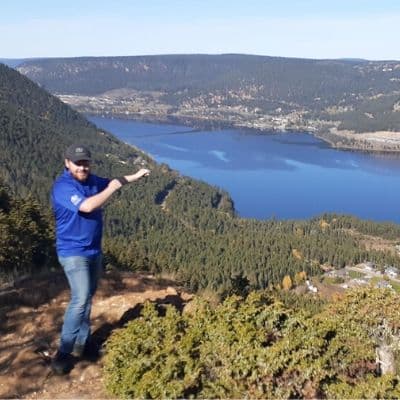
Torin Kelly is passionate about teaching and helping people gain new skills and tools to make a difference in their community. Torin attended BCIT for forestry and natural areas management, then specialized in invasive species. He has been working for the Invasive Species Council of BC since 2018 and is currently a Youth Facilitator with ISCBC.
Overview
Join us for the second session of Creative by Nature! Spread the word about invasive species through art- we can all be environmental artists! Art is a great way to raise awareness about invasive species and the importance of protecting biodiversity. During this lesson participants will learn how to draw and paint yellow-flag iris, an invasive species in British Columbia. Follow along in the comfort of your own home with your own painting supplies. Isabel will be using watercolour paints.
Presenter Bio
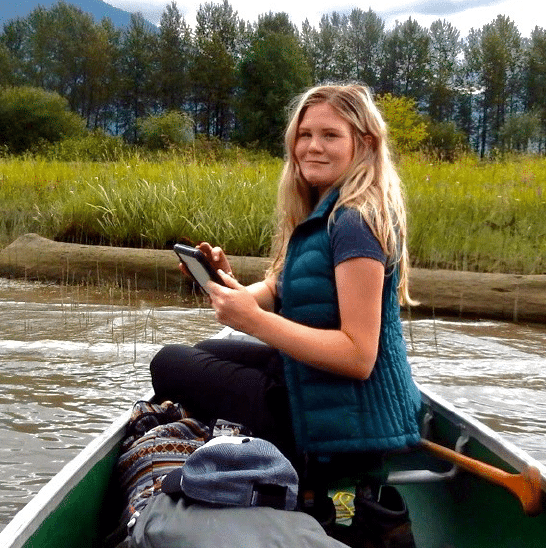
Isabel Gasior started her career journey in the environmental field in 2013, but her passion for the outdoors, plants, wildlife, and art started long before then. She holds a Diploma of Technology in Fish, Wildlife and Recreation from BCIT, and a B.Sc in Environmental Science from Royal Roads University. She first started creating scientific drawings of plants in school when learning how to identify different species. She has been working for the Invasive Species Council of Metro Vancouver (ISCMV) since 2015 and started integrating her art into the outreach and education materials whenever possible. Currently, she is the Project Manager at the ISCMV, but also works as a freelance artist on the side.
Overview
Tune into this webinar to learn more about priority invasive species, provincial and federal regulations and how to be a responsible pet and plant owner to prevent the introduction and spread of invasive species into BC’s native ecosystems.
Presenter Bio
Martina is the Invasive Fauna Unit Head with the BC Ministry of Environment and Climate Change Strategy and oversees the terrestrial and aquatic invasive animal program within the Ministry. Martina completed her graduate studies on the invasion ecology of the freshwater smallmouth bass in British Columbia lakes. She has been with the Ministry since 2015 and is based out of Victoria.
Overview
The third webinar of Invasive Species Action Month focused on Recreational Boating and Clean Drain Dry. As May 16-22 is National Safe Boating Week, there’s no better time to learn about safe boating and the Clean Drain Dry program. Edison Kim, Transport Canada, introduces the Office of Boating Safety, projects that involve Clean Drain Dry and key points on preventing the spread of invasive species. Nick Wong, Research and Projects Coordinator with ISCBC, highlights the importance of practicing Clean Drain Dry and the impact aquatic invasives have on habitats and our communities.
Presenter Bios
Edison Kim, Office of Boating Safety, Transport Canada
Edison Kim is a resident of Vancouver. He joined the Office of Boating Safety at Transport Canada in March 2020 when he transitioned over from the Royal Canadian Navy where he had been serving as a Naval Warfare Officer. He also currently acts as an advisor for the Tourism Invasive-Wise program for the Invasive Species Council of BC.
Nick Wong, Research and Projects Coordinator
Nick has diverse experience working previously in Pacific salmon and herring fisheries in BC, and has a PhD in Marine Ecology from the University of Auckland, New Zealand. Nick is passionate about teaching and creating engaging opportunities for people to learn and understand the role they can play in the prevention and mitigation of invasive species.
Overview
The third webinar of Invasive Species Action Month focused on Recreational Boating and Clean Drain Dry. As May 16-22 is National Safe Boating Week, there’s no better time to learn about safe boating and the Clean Drain Dry program. Edison Kim, Transport Canada, introduces the Office of Boating Safety, projects that involve Clean Drain Dry and key points on preventing the spread of invasive species. Nick Wong, Research and Projects Coordinator with ISCBC, highlights the importance of practicing Clean Drain Dry and the impact aquatic invasives have on habitats and our communities.
Presenter Bios
Edison Kim, Office of Boating Safety, Transport Canada
Edison Kim is a resident of Vancouver. He joined the Office of Boating Safety at Transport Canada in March 2020 when he transitioned over from the Royal Canadian Navy where he had been serving as a Naval Warfare Officer. He also currently acts as an advisor for the Tourism Invasive-Wise program for the Invasive Species Council of BC.
Nick Wong, Research and Projects Coordinator
Nick has diverse experience working previously in Pacific salmon and herring fisheries in BC, and has a PhD in Marine Ecology from the University of Auckland, New Zealand. Nick is passionate about teaching and creating engaging opportunities for people to learn and understand the role they can play in the prevention and mitigation of invasive species.
Overview
The Canadian Council on Invasive Species (CCIS) serves as a national voice and hub to protect Canada from the impacts of invasive species. With members and chapters from all corners of Canada, along with governments and businesses, the CCIS brings people together to build practical solutions to prevent the spread of invasive species. This presentation will review in further detail, the PlayCleanGo.ca campaign including available resources, the partnership program, examples of partners across Canada who are implementing this campaign and plans for future growth of the campaign. Learn how to join forces with like-minded organizations and how you can become a partner of PlayCleanGo.ca.
Presenter Bio
Kellie Sherman joined the CCIS as the Coordinator in 2017. Her previous employment included Coordinator of the Ontario Invasive Plant Council and Stewardship Technician with Kawartha Conservation. Kellie’s main role with the CCIS is project management, all things communication, fundraising, partnership building and event planning. Kellie lives in Peterborough, Ontario.
Overview
Broombusters Invasive Plant Society started in 2006, as East Vancouver Island residents watched Scotch Broom take over roads, farms and cleared forest land. With 15 years of experience, Broombusters has developed effective strategies to eradicate and slow the spread of broom, to draw and support volunteers, and to build partnerships with municipalities, ministries and communities. In 2018, over 500 volunteers cut broom for over 5000 hours from Campbell River to Victoria.
“Cut Broom in Bloom” is the slogan Broombusters created to summarize their approach. But what if the broom has been mowed or is too big or too much to cut? Joanne will discuss various approaches, techniques, and strategies to control the spread of this aggressive, invasive woody weed.
Pesticide Applicator Credits: This webinar is approved in British Columbia for one Continuing Education Credit (CEC) towards pesticide applicator certification. Participation in the live webinar was required.
Presenter Bio
Joanne Sales, Broombusters Invasive Plant Society
Joanne Sales is an organic blueberry farmer and award-winning essay writer. She is the founder and executive director of Broombusters. Visit their site at www.broombusters.org.
Overview
Become a part of the solution – learn how to identify and report new invasive grassland species. Invasive plants can threaten our natural resources, areas of cultural significance, infrastructure, and the health of people, animals and our environment. We have an opportunity to avoid these risks from plants that are new or not yet present in the province. The provincial Early Detection Rapid Response (EDRR) Program seeks to identify, contain and eradicate new invasive species early before this opportunity is lost. This talk will focus on several new invasive plant species that pose significant threats to BC’s grasslands, including how to identify and report them and the most likely places they will occur.
Credits: This webinar is approved in British Columbia for one Continuing Education Credit (CEC) towards pesticide applicator certification. Participation in the live webinar was required.
Presenter Bio
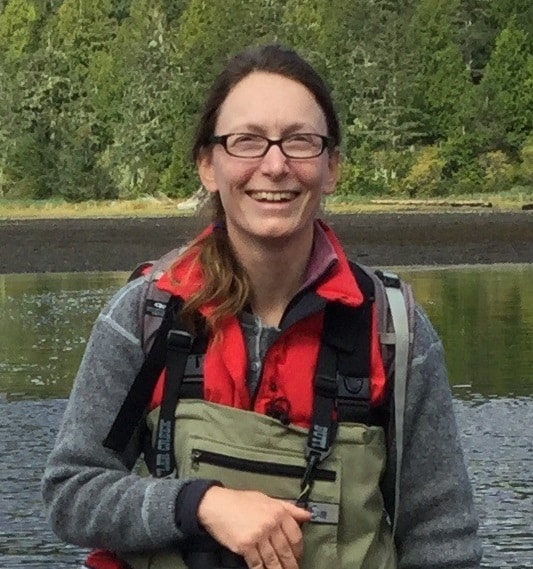
Becky Brown, Professional Agrologist and Invasive Plant Specialist, BC Ministry of Forests, Lands, Natural Resource Operations and Rural Development
Becky Brown is a Professional Agrologist and an Invasive Plant Specialist with the BC Ministry of Forests, Lands, Natural Resource Operations and Rural Development. Becky has been working in natural resource management throughout B.C. for the past 20 years, focusing on invasive plants since 2003. Her primary focus is coordinating the provincial Early Detection Rapid Response Program for Invasive Plants; including species risk assessments, report verifications, extent surveys, treatment trials, and establishing new permits and registrations. She also provides technical support to land managers working with established aquatic and terrestrial invasive plants, especially in the Coast region. Becky is based in Nanaimo, B.C.
Overview
Spread the word about invasive species through art- we can all be environmental artists! Art is a great way to raise awareness about invasive species and the importance of protecting biodiversity. During this lesson participants will learn the basics of plant identification and how to create scientific drawings of plants.
Presenter Bio
Isabel Gasior started her career journey in the environmental field in 2013, but her passion for the outdoors, plants, wildlife, and art started long before then. She holds a Diploma of Technology in Fish, Wildlife and Recreation from BCIT, and a B.Sc in Environmental Science from Royal Roads University. She first started creating scientific drawings of plants in school when learning how to identify different species. She has been working for the Invasive Species Council of Metro Vancouver (ISCMV) since 2015 and started integrating her art into the outreach and education materials whenever possible. Currently, she is the Project Manager at the ISCMV, but also works as a freelance artist on the side.
Overview
Do you want to make a difference in your community? This webinar will explain how you and your friends can have fun outdoors and protect BC’s biodiversity at the same time! We will define what makes a non-native species invasive, present some species to keep an eye out for, describe some of the ISCBC programs and share things you can do to preserve BC’s amazing biodiversity. The Invasive Species Council of BC (ISCBC) is a collaborative-based organization committed to reducing the spread and impacts of non-native species within BC. Part of Nick’s role focuses on educating and informing a diverse range of audiences on invasive species introduction and spread in British Columbia. Nick will define what makes a non-native species invasive, present some species to keep an eye out for, describe some of the ISCBC programs and share things you can do to preserve BC’s amazing biodiversity.
Presenter Bio
Nick Wong, Research and Project Coordinator, Invasive Species Council of BC
Nick is the Research and Projects Coordinator with the Invasive Species Council of BC. He received his BSc from Western University and an MSc and PhD in Marine Ecology from the University of Auckland.Nick is passionate about teaching and creating engaging opportunities for people to learn and understand the role they can play in the prevention and mitigation of invasive species.
Overview
Several of the highest priority weeds species that affect agricultural production in the Cariboo region were discussed in detail. Information on their biology and the characteristics that make them difficult to control, and their adverse impacts on grazing, forage and crop production was presented. Too often, management techniques for invasive plants address the symptoms and not the causes. Producers gained knowledge on strategic management options that can be taken to effectively prevent and manage these species, and two free phone apps that enable users to identify, report, and manage invasive weeds were highlighted.
Presenter Bio
Dave Ralph, Invasive Species Council of BC
Dave Ralph joined the Council in May 2015. He has worked extensively with land managers and the agriculture industry in developing invasive plant management strategies and carrying out research for invasive plant control and management recommendations for pasture, range and intensive crop production. His current role with the Council is training and project coordination.
Overview
Invasive species are a serious issue world-wide, and it is vital to engage and support all British Columbians in taking action. Young people are a particularly important audience; invasive species, unlike many large-scale environmental issues, are something that youth can actually do something about, in a hands-on, experiential way. Targeting specific audiences with information and resources that are relevant, applicable and user-friendly is a key element of successful engagement. Sue will explore recent research into engagement and review a variety of educational strategies and new resources that support a range of audiences in tackling invasive species in their communities.
Presenter Bio
Sue has been with the ISCBC since 2013, and has experience in curriculum development, teacher professional development and evaluation. Sue is developing and promoting province-wide educational programs on invasive species.
2019
Overview
In this webinar you will learn about the range of grasshoppers present in the Cariboo, their impacts on the agriculture sector and mitigation tactics. This webinar will be of particular interest to agricultural producers in the Cariboo region. As it it will include information on recognizing non-pests, this webinar may also be of value to environmental researchers interested in ecosystem health and food webs
Presenter Bio

Dan Johnson is currently Professor of Environmental Science at the University of Lethbridge, with research in biogeography, environmentally sustainable agriculture, entomology, biodiversity, rational pest management, biological control, ecology, insect movement, biometeorology, alternatives to chemical pesticides, insects as vectors of plant diseases, methods of forecasting, wildlife ecology, environmental safety, and analysis and modeling of environmental and experimental data.
*February 4, 2020 Update: Adobe Connect has indicated they are having internal issues with loading webinar recordings through a browser. If you experience technical difficulties loading this webinar in your browser, you may view it through the Adobe Connect application for desktop with Windows and Mac OS (download here https://helpx.adobe.com/adobe-connect/connect-downloads-updates.html) , or on the Adobe Connect for mobile in Android and iOS. The webinar will be loaded on the ISCBC Youtube page for February 5, 2020.
Latest News & Events
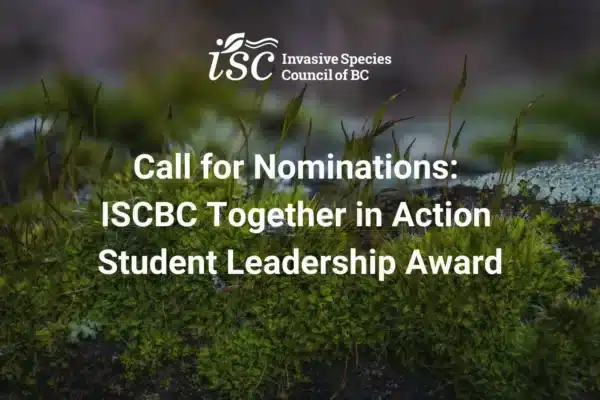
Council News
Call for Nominations: The ISCBC Together in Action Student Leadership Award 2024Support BC’s student leaders by submitting your nominations today!
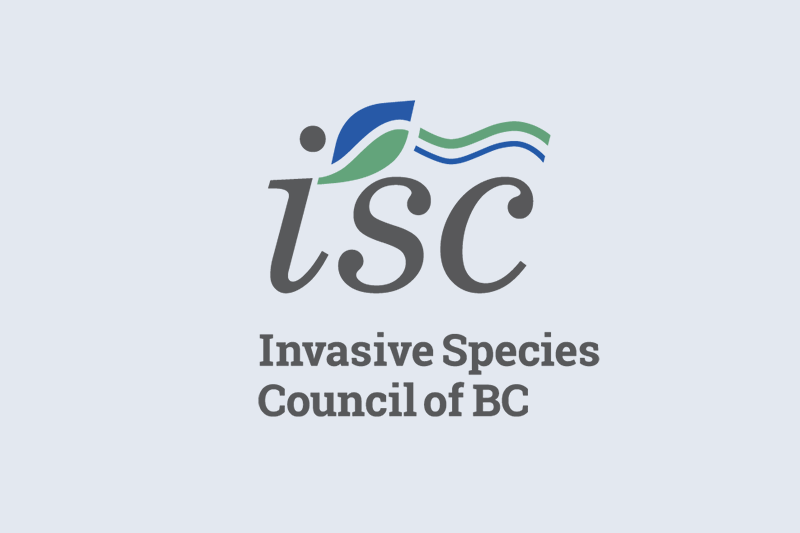
Council News
Call for Nominations: The ISCBC Together in Action Individual Leadership Award 2024Support BC’s individual leaders by submitting your nominations today!
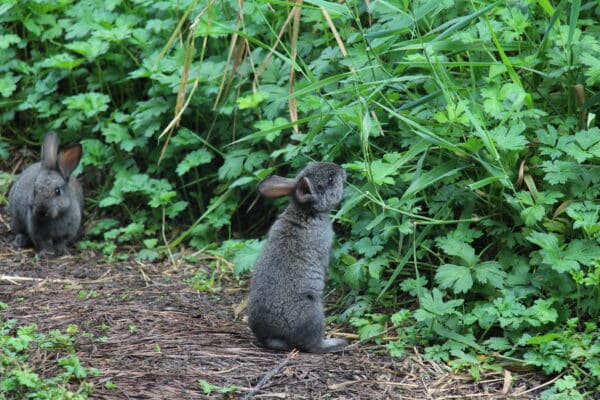
Council News
The Easter Bunny BluesBy Lisa Houle | March 28, 2024 There is no denying bunnies are cute. With spring and Easter in the spotlight, these little bundles of energy with their floppy ears…
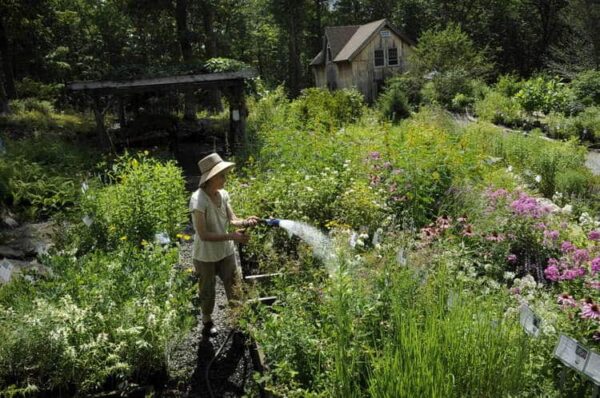
Council News
Producing your best yard from the ground upBy Lisa Houle | March 28, 2024 Temperatures are warming and the soil is awake with new life. It’s spring in B.C.! The greenery that greets us first, however, may…

